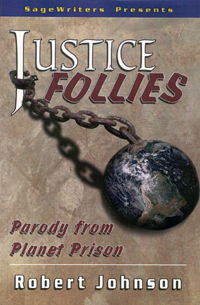
Justice Follies: Parody from
Planet Prison
Robert Johnson
Review by Alyce Wilson
Justice Follies satirizes the brutal life inside prison and is every bit as brutal as the life it describes. The lighthearted tone, often making use of rhyme, especially in the skits that appear in the collection, can blur the distinction between satire and pure entertainment.
The afterward by Paul Leighton posits that this is because of the author's attempt to comment, as well, on the inanity of popular culture and the way that prison culture and crime culture are turned into entertainment without depicting the true brutality of this sexualized, violent world. That line is blurred a little too much, however, for readers to determine the author's intent. Many pieces seem to wallow in the brutality rather than commenting on it.
Where Johnson is most successful are the pieces where the purpose of the parody is clear. For example, in "Saint Burnout," he tells the story of a young prison guard who enters the system, hoping to make a difference, and eventually becomes disillusioned, disheartened and just as cruel as the prisoners themselves.
While it doesn't necessarily have as defined a purpose, "Death House Barbie" riffs on the idea of Ken as a Death Row inmate. This piece is entertaining and addresses societal concepts such as sexuality, celebrity and the death culture.
The pieces that don't work as well, however, are the ones that seem to simply wallow in the sexualized violence, such as in "Mister Rogers Prison," which places Mr. Rogers in a prison to host a show featuring prison inmates. A lot of the jokes come across as very obvious, the sort of low humor that anyone could produce.
One of the skits, the biting social commentary "Wheel of Torture" was produced by a local theater, the Justice League Players. It would be interesting to see how they handled the dialogue, which is filled with rhyme and not particularly naturalistic. In this case, the sing-song quality of the speech might have helped accentuate the satire. The piece is about a fictional game show where contestants are derided and submit to a humiliating turn of the "wheel of torture" to determine their sentences. All of these characters are based on real-life offenders whose circumstances forced them into crime, such as a poor mother who left her children unattended to go to work and lost them in a fire set by an arsonist.
Because of the strong language and situations, a general audience is unlikely to embrace this work, aside from correctional officers, prison administrators and those interested in prison reform.
Some pieces in this collection are stronger than others, making the
collection worth a look. I would be interested to view Johnson's serious
academic works on the subject, because his pieces work better when he
stays away from over-the-top crude humor and, instead, concentrates
on making a more focused satirical point.
Infinity Publishing Company, 2005: 0-7414-2592-0